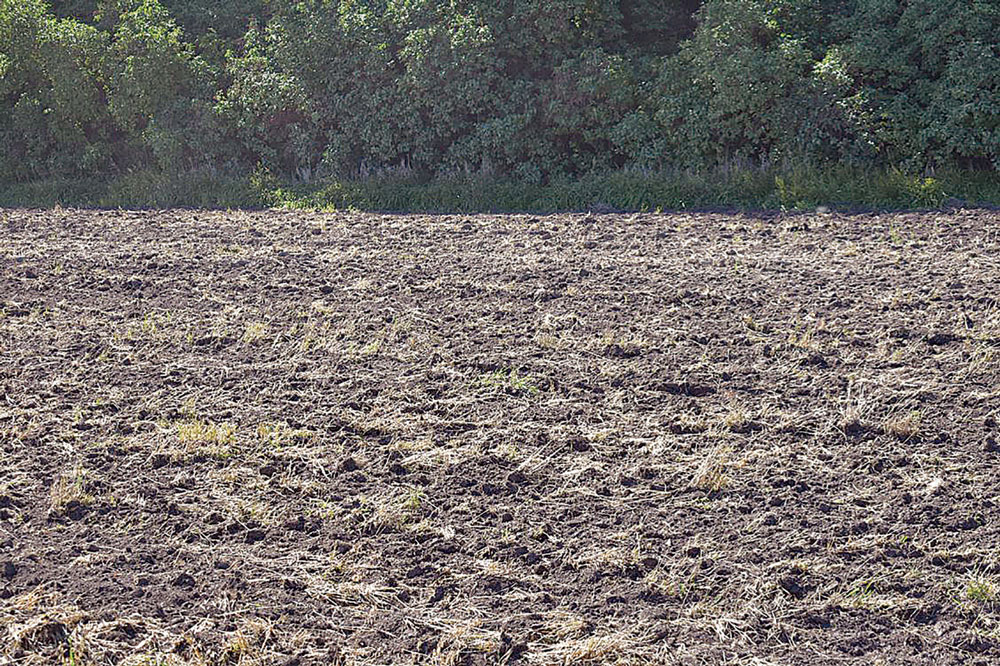In a challenging year, conservative methods are key for fall tillage

Sue Sitter/PCT Soil turned over by conventional tilling sits after harvest on a plot of land in western Pierce County.
Some growing seasons challenge farmers more than others. Pierce County Extension agent Brenden Klebe calls the tough 2021 season “a learning year.”
“They call this year a learning year, but things have been so drastic, it’s hard to still call it a learning year,” Klebe said from his office recently. “So much of the data is skewed,” he added, referring to a Pierce County growing season that saw little rain early on, then a few days of above average precipitation just as harvest time began for crops such as wheat.
Unpredictable weather and growing conditions come with the territory in ag, giving farmers an opportunity to adapt.
Klebe said farmers preparing for fall and winter after a summer that saw exceptional drought conditions would likely take “a conservative approach.”
For fall tillage, Klebe said a balance between no-till and conventional tillage would bring best results.
“This year, the drought has changed a lot of mindsets,” Klebe said of Pierce County farmers.
“From the field variability, throughout the summer, you can see guys that did a lot more conservative tillage, maybe strip tillage or no tilling have had better luck with holding their moisture this year,” Klebe said. “I think that’s going to be the biggest thing.”
“This year, it’s going to be between no-tillage and I think, even strip tillage – that’s caught on lately,” Klebe said. “With conventional tillage, you’re moving the whole ground, where with no-till, you’re not moving any ground. But with strip tillage, you have spikes on your cultivator or tillage equipment and you’re just making rows of tilled ground down the field. So, it’s a lot less, but you’re still working the ground a little bit.”
“And farmers have seen a lot of success in that warming up the ground a little better in the spring, even,” Klebe added. “Also, they’ve seen certain crops liking that a little better, too.”
Klebe explained, “Generally, soybeans can handle no-till a little better, where canola and wheat are cooler-season crops that are going to be dealing with some cold temperature soils. Strip tilling seems to warm the ground up enough, especially when the farmers are getting going earlier and earlier in the year. Those (using strip tillage) are going to be the ones who are going to benefit the most with the ground warming up in the spring.”
A warmer September, a few rainy days and a lack of morning frost have all added to the challenges for Pierce County farmers.
“Warmer temperatures later into fall make farmers think about the fertility side of things, especially with the dryness. A lot of people want to be putting down nitrogen products in the fall,” Klebe said. “Well, when we’re staying warm like this, it’s very easy to lose a lot of them on the ground. Our window of putting down nitrogen is getting a lot skinnier now with warmer weather.”
Later fertility means weeds will thrive as well, according to Klebe.
“With the warmer temps, we’re going to see more winter weeds, like mare’s tail,” Klebe added. “That’s the biggest problem weed we deal with in Pierce County. I hope guys are taking advantage of the warm weather to do some fall spraying. A lot of those weeds are actively growing still because it hasn’t reached below freezing at night. So, as long as it doesn’t reach below freezing, they’re going to keep growing.”
“And,” Klebe added, “with mare’s tail, if they get above six inches, in the spring, they get even harder to kill because of the hundreds of growing points they have. If you can be spraying your weeds this fall, especially because of the warm temps we’ve had and now the recent moisture we’ve had, I would definitely recommend it.”
Klebe said he hoped the moisture the north central part of North Dakota saw in September would continue into winter and spring.
“If it shuts off again completely, we’re going to be in the same exact boat we’re in again, and I guess this year wasn’t a learning year yet. I hope we got this one out of our system and we can go back to our normal cycle,” Klebe said.
